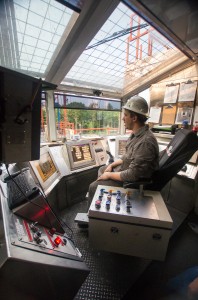New fracking jobs number likely more accurate, say economists

Joe Ulrich / WITF
Pennsylvania recently changed the way it counts gas industry jobs. Economists say the new estimates are probably more accurate.
Pennsylvania’s new way of counting jobs related to Marcellus Shale drilling is probably more accurate, say economists who study the industry.
Last week Governor Tom Wolf’s administration changed the way the state Department of Labor and Industry tracks gas jobs. Approximately 30,000 people work directly in oil and gas sectors. Under the old method, the department used to count another 200,000 people in 30 related industries. Now the agency says nearly 90,000 jobs in Pennsylvania are linked to drilling.
Industry trade groups and former Governor Tom Corbett have often credited the Marcellus Shale with supporting more than 200,000 jobs.
Matthew Rousu is an economics professor at Susquehanna University who recently authored a paper critiquing various studies that examine the economic impacts of the gas industry. He noted many “clearly exhibit bias either for or against fracking.”
Rousu was quick to point out that he disagrees with Wolf on many issues. For example, he’s not convinced the state needs a new tax on gas production.
“I think they’re doing a lot of things wrong.” Rousu says of the Wolf administration. “But this change seems pretty reasonable to me. The previous jobs number did seem high. But 90,000 is an enormous number. It’s 1.5 percent of workers in the state.”
In its new analysis, the labor department says direct employment in the oil and gas industry more than tripled (from 9,659 to 33,137) in the seven years since the Marcellus boom began.
That’s nothing to sneeze at, since many of the new jobs are in rural areas with low populations, according to Penn State University professor Tim Kelsey. He studies the economic impact of the Marcellus Shale and previously raised questions about the state’s old method of counting gas jobs.
“I don’t think there’s any doubt, this change is going to create much more accurate estimates of the employment impacts than what had been done previously,” he says. “Before, they counted all employment in trucking. All employment in highway construction. All employment in engineering services in Pennsylvania–regardless of whether that had anything to do with Marcellus activity.”
The old jobs figure was questionable because it was more than seven times higher than the number of direct jobs. When it comes to measuring the impact of an industry, both Kelsey and Rousu say economists tend to be skeptical of multipliers higher than two.
The Wolf administration’s analysis shows the overall number of direct and related jobs grew by 59,394 from the beginning of the drilling boom in 2007 to late 2014.
“The overall multiplier is around 2.5, which is higher than typical with economic analysis,” Kelsey says of the new number. “Yet this probably is still realistic because gas jobs are so high paying compared to the average wages in a community.”
















